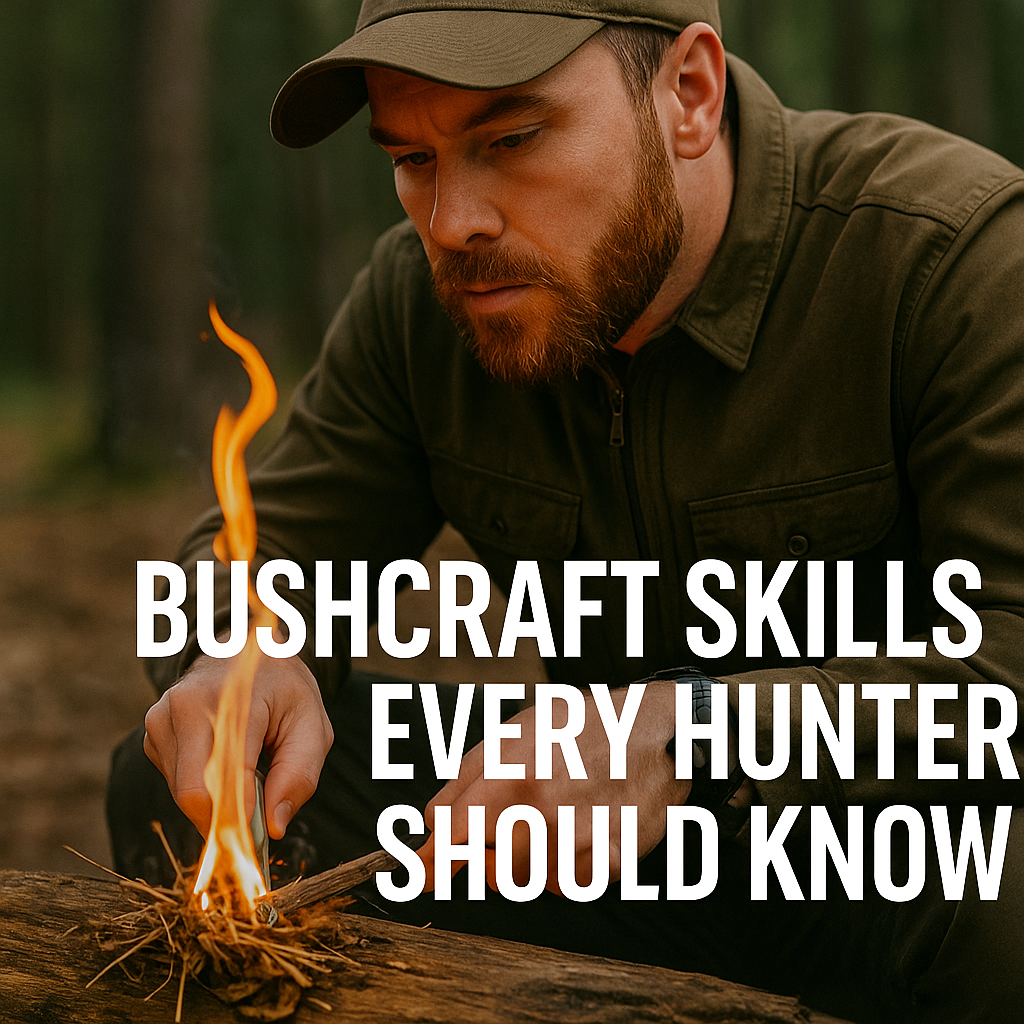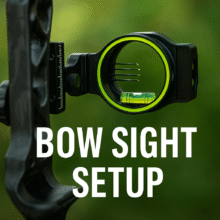Bushcraft Skills Every Hunter Should Know

Hunting is more than carrying a rifle or bow into the woods. True hunters develop a deep connection with the land, mastering survival and bushcraft skills that make the difference between a good day outdoors and a dangerous situation. Whether you’re chasing elk in the Rockies, stalking whitetails in the Midwest, or waiting on wild hogs in the South, the wilderness demands respect.
In this guide, we’ll cover the bushcraft skills every hunter should know—skills that not only keep you safe but also make you more effective, resourceful, and confident in the field.
Table of Contents
- Why Bushcraft Matters for Hunters
- 1. Shelter Building
- 2. Firecraft
- 3. Water Procurement and Purification
- 4. Navigation Without GPS
- 5. Tracking and Sign Reading
- 6. Foraging and Wild Food Knowledge
- 7. Knife and Tool Skills
- 8. First Aid and Wilderness Safety
- 9. Weather Reading
- 10. Snares and Traps (Ethical Use)
- 11. Campcraft and Cooking in the Wild
- 12. Mental Resilience & Bushcraft Mindset
- FAQs on Bushcraft for Hunters
- Final Thoughts
Why Bushcraft Matters for Hunters
Many hunters today rely heavily on modern gear—GPS, rangefinders, synthetic clothing, and freeze-dried meals. While these tools are useful, batteries die, weather shifts, and unexpected challenges arise. Bushcraft is about self-reliance, using natural resources and traditional techniques to survive and thrive in the wild.
Key reasons bushcraft is essential for hunters:
- Safety: Emergencies can happen. A twisted ankle, lost trail, or sudden storm requires survival skills.
- Efficiency: Building shelters, making fire, and navigating with nature increase your adaptability.
- Connection with Nature: Understanding the land sharpens your hunting instincts.
- Ethics & Tradition: Bushcraft keeps alive the skills of our ancestors who lived off the land.
1. Shelter Building
When weather turns bad, a solid shelter can save your life. Even with modern tents, hunters should know how to build one from natural materials.
Types of Bushcraft Shelters:
- Lean-to Shelter: Simple, effective, and fast to build using a ridgepole, branches, and foliage.
- Debris Hut: Insulated with leaves, grass, and moss, perfect for cold conditions.
- Tarp Shelter: Lightweight tarps combined with paracord make versatile setups.
Pro Tip: Always build with wind direction and drainage in mind. A poor shelter location can be worse than none.
2. Firecraft
A fire provides warmth, cooks food, purifies water, and boosts morale. Every hunter should master multiple fire-starting methods.
Essential Fire Skills:
- Spark-Based Fire Starting: Using a ferro rod or flint and steel.
- Friction Fire: Bow drill or hand drill—challenging but worth knowing.
- Modern Backups: Waterproof matches and lighters as insurance.
Bushcraft Fire Tips:
- Gather tinder (birch bark, dry grass, fatwood) before you need it.
- Build a fire lay (teepee, log cabin, or lean-to) for efficient burning.
- Always keep a small emergency fire kit in your hunting pack.
3. Water Procurement and Purification
Dehydration kills faster than hunger. Hunters can’t always rely on carrying gallons of water, especially during long backcountry hunts.
Finding Water:
- Natural sources: streams, springs, and lakes.
- Rainwater collection using tarps or leaves.
- Solar stills in arid regions.
Purification Methods:
- Boiling: Most reliable.
- Filtration: Portable filters or improvised sand and charcoal filters.
- Chemical Purification: Iodine tablets or chlorine drops.
SEO Keyword Integration: “bushcraft water purification techniques for hunters”
GPS devices are fantastic—until batteries die or satellites fail. Traditional navigation is a vital hunter’s skill.
- Using the Sun: Shadows and position for east-west orientation.
- Stars: The North Star as a guide in the Northern Hemisphere.
- Landmarks: Rivers, ridges, and valleys as orientation points.
Tools to Master:
- Compass and Map Reading: Still the gold standard for reliable navigation.
- Pacing & Bearings: Estimating distance without electronics.
Pro Tip: Always carry a backup compass and mark mental landmarks when scouting or tracking game.
5. Tracking and Sign Reading
Bushcraft and hunting overlap strongly in tracking. Hunters who can “read the land” gain an advantage in finding game.
Tracking Skills:
- Footprints & Hoof Prints: Identify species, size, and direction.
- Scat: Reveals diet, freshness, and animal presence.
- Feeding Signs: Bark stripping, grazed plants, and disturbed ground.
Practical Use: Even if game trails are faint, a skilled tracker can follow subtle clues to locate deer, elk, or other targets.
6. Foraging and Wild Food Knowledge
While hunters aim to harvest game, knowing edible plants and fungi increases survival odds and deepens wilderness knowledge.
Common Edibles:
- Berries (blueberries, blackberries).
- Nuts (acorns, walnuts).
- Greens (dandelion, plantain, cattails).
Bushcraft Warning:
Never eat unknown plants—many are toxic. Use the “Universal Edibility Test” only as a last resort.
Hunters often find foraging handy while waiting in blinds or when extending hunting trips.
7. Knife and Tool Skills
A bushcraft knife is a hunter’s best friend. Beyond field dressing game, it can be used for shelter building, carving traps, and fire preparation.
Knife Bushcraft Skills:
- Feather Sticks for tinder.
- Batoning Wood for firewood.
- Carving Stakes and Snares for trapping.
Other Essential Tools:
- Hatchet or Axe: For splitting wood and shelter poles.
- Paracord: Versatile for traps, repairs, and shelter.
- Multi-tool: Adds modern convenience.
8. First Aid and Wilderness Safety
Accidents happen in hunting. A hunter without medical knowledge is vulnerable.
Must-Know First Aid Skills:
- Treating cuts, blisters, and burns.
- Splinting sprains and fractures.
- Controlling bleeding with pressure and tourniquets.
Bushcraft Tip: Learn how to use natural resources—like moss as bandages or willow bark for pain relief.
9. Weather Reading
Modern forecasts help, but hunters must read nature’s signals.
Natural Weather Signs:
- Red Sky at Night: Clear weather ahead.
- Sudden Silence of Birds: Storm approaching.
- Cloud Types: Wispy cirrus means fair weather; dark cumulonimbus means storms.
Hunters who anticipate weather changes avoid getting stranded or surprised.
10. Snares and Traps (Ethical Use)
In a survival situation, knowing how to set snares and traps provides backup food.
Simple Traps:
- Figure-4 Deadfall
- Spring Snare
- Paiute Deadfall
Ethics Note: Use only in survival or where legal. Hunting should remain ethical and conservation-focused.
11. Campcraft and Cooking in the Wild
After a successful hunt, preparing meat in the field is crucial.
Skills to Learn:
- Building a Spit or Rack: For smoking and drying meat.
- Stone Boiling: Heating stones to boil water or soup.
- Primitive Ovens: Cooking with heated clay or earth pits.
Not only does this preserve food, but it also connects you to ancient hunting traditions.
12. Mental Resilience & Bushcraft Mindset
Perhaps the most underrated bushcraft skill is mental toughness. Survival often comes down to attitude.
Key Traits:
- Calm Under Stress: Panic kills faster than cold.
- Problem-Solving: Use what you have, not what you wish for.
- Adaptability: Weather, terrain, and wildlife don’t follow your plan.
Hunters with strong bushcraft skills approach the hunt with confidence and respect.
FAQs on Bushcraft for Hunters
Q1. What bushcraft skill is most important for hunters?
Firecraft and navigation are the top priorities—fire for survival, navigation for safety.
Q2. How do bushcraft skills improve hunting success?
They increase awareness, reduce reliance on gear, and make hunters better trackers and observers.
Q3. Do all hunters need bushcraft training?
Yes. Even weekend hunters benefit from knowing shelter, water, and fire basics.
Q4. What’s the difference between bushcraft and survival skills?
Bushcraft focuses on thriving and working with nature; survival is about emergency situations.
Final Thoughts
Bushcraft isn’t just about survival—it’s about mastery of the land, resourcefulness, and self-reliance. For hunters, these skills are invaluable. Whether you’re deep in the backcountry or a few miles from your truck, nature is unpredictable. By learning bushcraft skills every hunter should know, you ensure safety, success, and a stronger connection to the wild.
So, next time you head into the woods, don’t just bring your rifle or bow. Bring knowledge, resilience, and the bushcraft mindset. That’s what separates a true hunter from a weekend shooter.







